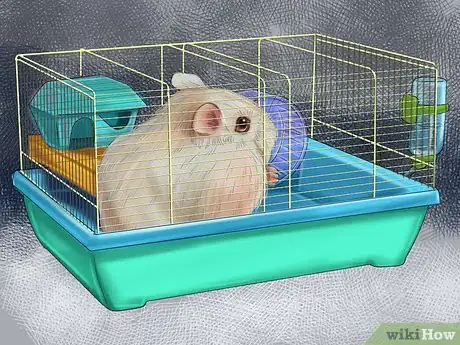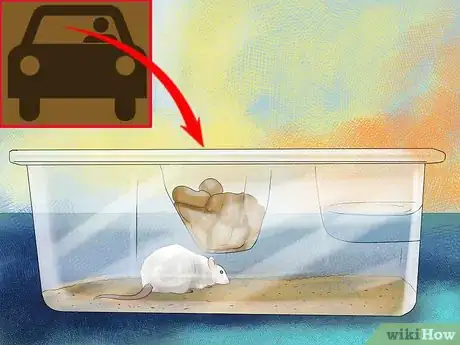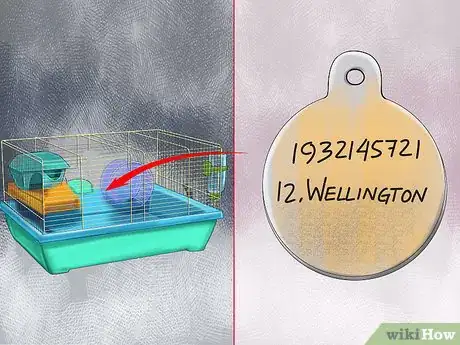This article was co-authored by Pippa Elliott, MRCVS. Dr. Elliott, BVMS, MRCVS is a veterinarian with over 30 years of experience in veterinary surgery and companion animal practice. She graduated from the University of Glasgow in 1987 with a degree in veterinary medicine and surgery. She has worked at the same animal clinic in her hometown for over 20 years.
There are 10 references cited in this article, which can be found at the bottom of the page.
This article has been viewed 36,592 times.
When planning a vacation, you need to consider how to keep your pets healthy, safe, and happy while you’re away. Taking care of mice is relatively simple as they are low maintenance pets. The easiest choice is having a friend come and feed your mice every day or two. As long as you make sure your temporary caregiver knows how to handle your mice, you should be good to go. In other circumstances, such as if you’re traveling for a long period of time, you may want to leave your mice elsewhere or take them with you. In these cases, you should plan carefully to maximize your mice’s comfort and wellbeing.
Steps
Leaving Mice at Home
-
1Leave your mice alone on a short trip. How you should care for your mice will depend on how long your trip is. If you are only leaving home for a day or two, leave an extra bowl of food and fill your mouse’s water dish or bottle with a fresh supply. Since mice can dehydrate quickly, it's a good idea to also put in a backup water bottle.[1]
- The amount of food you need to leave depends on how many mice you have. If you have more than one, leave two extra food bowls, especially if one mouse tends to eat more than the other.
-
2Find somebody to feed your mice. If you are leaving for an extended amount of time, you’ll need to find somebody to feed your mice. You can either ask a trusted friend to come feed your mice or hire a pet sitter.[2]
- If you decide to ask a friend to watch your mice, make sure their schedule will allow them to come at least once every two days to check on your mice.[3]
- Hiring a sitter is costly but ensures that your mice will be taken care of in your absence. Be sure to check references and have your sitter come over and handle the mice in front of you first to make sure it’s a good fit.[4]
- You can also hire a house sitter to live in your house while you’re away. A house sitter will not only take care of your mouse, but also keep your house clean and safe while you’re gone.[5]
- Like people, mice get lonely. The females especially love the company of their owners. Try to find someone who is available to check in on your pet daily to prevent your mouse from becoming too lonesome.[6]
Advertisement -
3Leave instructions for the person watching your mice. Tell whoever is watching your mice exactly what they need to do. This includes information on how many times a day your mice need to be fed, what kind of food they eat, what kind of treats (especially fruits and veggies) can be given, how to catch them if they escape, and how often to clean the cage.[7]
- Be certain that your caregiver knows what kinds of foods are toxic to mice, such as chocolate, peanuts, acidic fruits and vegetables, and raw meat.
- Type up the information and leave it in an obvious spot next to the cage just in case your caregiver forgets.
-
4Buy your mouse a new toy before you leave. Mice are intelligent animals that need stimulation and exercise. If you tend to handle and play with your mouse, it’s a good idea to buy them a new toy before you leave so that they don’t become bored.[8]
- Mice need to chew. Their teeth are constantly growing and need to be worn down. Make sure that they have sufficient chew toys to last the course of your trip to maintain the mice’s dental hygiene.[9]
Leaving Mice with Somebody Else
-
1Determine the best situation for your needs. It can be hard to find somebody willing to look after your mice if you’re going away for a long vacation. Having a friend watch over your pet is the best option financially, but if you’re unable to find a friend or family member to do the job, you may have to seek alternative options.[10]
- It’s hard to find a pet hotel or boarding facility that will take rodents, but you can talk to somebody at a pet shelter or humane society to see if they can find you a reliable sitter or volunteer.[11]
- If your mouse is sick, you can have it stay at your local vet. You will have to check first to make sure your vet provides this service. It may cost extra.[12]
-
2Make sure you leave your mice in a safe environment. Be sure your mice’s new home is appropriate for their needs. If your caregiver has young children, make your caregiver aware that the children are not to handle the mice unsupervised.[13]
- If the caregiver has other pets, make sure they are dedicated to keeping the mice out of harm’s way. Animals such as dogs, cats, ferrets, snakes, or rats might try to eat your mice if they are left out of the cage.[14]
- Mice can overheat and die if left in sunlight for too long. Have the caregiver store the cage away from heavy sun exposure, especially if it’s summertime. In winter, be sure the mice get sufficient warmth and are not left outside.[15]
-
3Leave instructions for your caregiver. Make sure your caregiver knows how often to feed your mice, change their water, and clean their cage. It’s best to have them over before you leave to show them how to properly handle your mice.[16]
- Type up instructions for your caregiver in case they forget.[17]
- If you’re leaving your mice in a family that has children, it’s especially important that the children know how to take care of the mice as well. Leave a list of foods that are toxic to mice (chocolate, peanuts, acidic fruits and vegetables, raw meat) next to the cage.
Taking Mice with You When You Travel
-
1Only take mice with you if necessary. Travel is stressful on mice. If you are going on vacation for months and can’t find anybody to watch your mice and can’t afford to pay your sitter, then it might be appropriate to take your mice along.[18]
-
2Ensure mice-friendly accommodations. Call ahead to make sure your hotel, motel, or rental will allow you to bring your mice. If you’re going to be staying in multiple locations or are unsure of how long you will be in each destination, keep a list handy of potential pet-friendly places to stay that you can reference on the fly.[19]
- If you are traveling in a way other than your car, make sure that small pets are allowed on board. Some airlines, trains, or busses may have rules pertaining to animal travel. Call ahead to make arrangements to ensure a safe journey for your mice.[20]
-
3Bring extra food and water. Make sure you have enough supplies to last throughout the trip so that your pet doesn’t get hungry and stressed. Keeping treats somewhere easily accessible such as the glove compartment and give out every few hours.[21]
- Purchase a travel water bottle. These are designed to be spill-free on the go. You can purchase these at Petco or any other local pet store.[22]
-
4Put a nametag and ID on the cage. Fasten a nametag with your phone number, address and email onto the cage. This will help you be reunited with your pet in the event that your cage is somehow lost or stolen during travel. [23]
Warnings
- Never travel with a pregnant mouse or one with a young litter.⧼thumbs_response⧽
- Only travel with your mice if absolutely necessary. Travel can be very stressful for them.⧼thumbs_response⧽
Things You'll Need
- Lots of toys
- Pet-friendly hotel
- Trusted caretaker (if leaving mice at home)
- Vet contact details
References
- ↑ http://animals.mom.me/pet-mice-eat-1161.html
- ↑ http://www.thebarefootnomad.com/travel-tips/what-to-do-with-your-pets-when-you-go-on-vacation/
- ↑ http://www.thebarefootnomad.com/travel-tips/what-to-do-with-your-pets-when-you-go-on-vacation/
- ↑ http://www.thebarefootnomad.com/travel-tips/what-to-do-with-your-pets-when-you-go-on-vacation/
- ↑ http://www.thebarefootnomad.com/travel-tips/what-to-do-with-your-pets-when-you-go-on-vacation/
- ↑ https://www.vetbabble.com/small-pets/mice/
- ↑ http://www.rmca.org/Resources/mouse-faq.txt
- ↑ http://www.peteducation.com/article.cfm?c=18+1804&aid=3455
- ↑ http://www.peteducation.com/article.cfm?c=18+1804&aid=3455
- ↑ http://www.thebarefootnomad.com/travel-tips/what-to-do-with-your-pets-when-you-go-on-vacation/
- ↑ http://www.thebarefootnomad.com/travel-tips/what-to-do-with-your-pets-when-you-go-on-vacation/
- ↑ http://www.thebarefootnomad.com/travel-tips/what-to-do-with-your-pets-when-you-go-on-vacation/
- ↑ https://www.vetbabble.com/small-pets/mice/
- ↑ https://www.vetbabble.com/small-pets/mice/
- ↑ https://www.vetbabble.com/small-pets/mice/
- ↑ http://www.rmca.org/Resources/mouse-faq.txt
- ↑ http://www.rmca.org/Resources/mouse-faq.txt
- ↑ http://www.thebarefootnomad.com/travel-tips/what-to-do-with-your-pets-when-you-go-on-vacation/
- ↑ http://www.drsfostersmith.com/pic/article.cfm?aid=1005
- ↑ http://www.thebarefootnomad.com/travel-tips/what-to-do-with-your-pets-when-you-go-on-vacation/
- ↑ http://www.drsfostersmith.com/pic/article.cfm?aid=1005
- ↑ http://www.drsfostersmith.com/pic/article.cfm?aid=1005
- ↑ http://www.drsfostersmith.com/pic/article.cfm?aid=1005
About This Article
To care for your mice during a vacation, leave an extra bowl of food and fill their water bowl if you’ll only be away for a day or 2. Alternatively, ask a friend or hire a pet sitter to drop by at least every 2 days to feed your mice. Make sure to leave instructions about your mice, including what kind of food they eat, how to catch them if they escape, and how often to clean the cage. You can also buy a new toy for your mice before you leave, like something to chew on, so they don’t get bored while you’re away. For tips from our Veterinary co-author on how to travel with your mice, read on!






































































